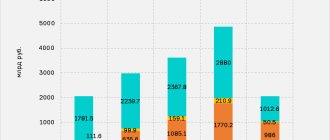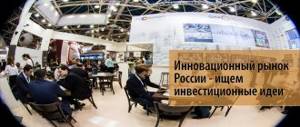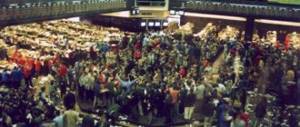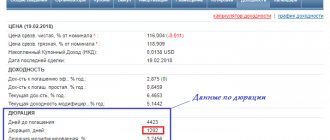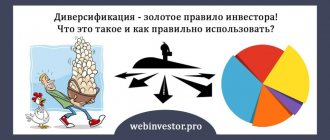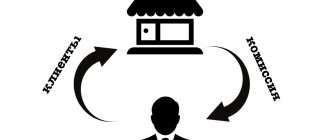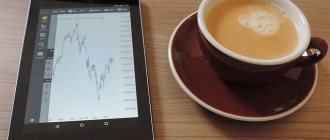olegas Feb 19, 2021 / 108 Views
The over-the-counter market refers to all trading operations carried out with securities outside the exchange. The fact is that not all companies can meet the requirements that the exchange imposes on its participants. Consequently, there are many companies that are not listed on the exchange, but need investment, and therefore sell their shares through various intermediaries. By the way, in addition to shares, the over-the-counter market includes such financial instruments as forwards, over-the-counter bonds, options, etc.
In the West, the over-the-counter market is called over the counter (OTC), which literally means “above the counter”, or, in other words, all those operations that take place outside the official counting (exchange).
The main disadvantage of the over-the-counter market is the absence of a single regulatory authority, i.e. It is inherently decentralized. This leads to such significant shortcomings as: lack of control over the purity of transactions, lack of uniform rules and regulations.
Over-the-counter securities market
Yes, gentlemen, in order to fully understand the entire concept of an over-the-counter transaction, we simply urgently need to understand the primary sources of interactions, this very over-the-counter trading.
Otherwise, if you miss some aspects of information on this topic, a very thick and viscous “porridge” will form in your heads, with which it will subsequently be quite problematic to understand the very essence of the OTC transaction itself. In the USA, these trading platforms are called “over the counter”, (OTS) which, literally translated into our Russian language, means “over-the-counter” . That is, bypassing the stock exchange. This refers, of course, to officially state-owned exchange platforms, such as the NYSE or NASDAQ.
https://www.youtube.com/watch?v=Mcc-GkjkOvE Video on the topic (English speech)
We, in the Russian Federation, also have a multifunctional information system where you can not only purchase, but also observe and also track indicative quotes of securities and other financial instruments that are not traded on the official exchange market. The name of this over-the-counter trading section, the stock exchange, is RTS Board. I would like to immediately add that this site deals mainly with securities that, for one reason or another, could not pass the listing procedure. And also there are in circulation securities of small or medium capitalization.
Advertising the site
For our complete understanding, this phrase (RTS Board) can be literally translated as “commission” or “committee of the Russian Trading System” . Access to this multifunctional system, and at the same time, trading platform, is carried out via the Internet, through the use of the Quatro platform interface. And here you don’t need to be a genius to understand that to sign an agreement and conclude transactions or contracts in the Board system, electronic digital signature (EDS) technology is used.
Classification of exchanges
The functions of the stock market are implemented on exchanges.
There are several varieties that perform their tasks in accordance with the characteristics and specifics of the market. They can be divided according to appropriate characteristics.
By specialization:
- stock;
- commodity and raw materials;
- currency;
- cryptocurrency.
By type of organization:
- government;
- private;
- mixed.
In modern conditions, most stock markets have types of joint stock companies. They perform their functions while simultaneously being full-fledged players and receiving additional income from the issue of their own shares.
By way of participation:
- open exchanges where everyone has the right to participate in trading;
- closed, where only registered members of the exchange are allowed to participate.
By transaction type:
- futures. These are transactions that involve the delivery of goods or securities over a period of time;
- optional. These are transactions in which only the right to purchase goods or assets is acquired;
- sales of real goods;
- mixed, where contracts of different types are simultaneously involved.
As a rule, the exchange is focused on one type of contract, since different types of transactions are subject to their own rules, and specialized tools are used to carry them out.
Note! There is one more criterion by which exchanges can be divided into international and regional ones. In the former, transactions are made involving entire industries; often the players are states or corporations of global importance. The scale of the latter is not so large and is limited to financial transactions within the country or region.
Unorganized over-the-counter securities market
In general, the entire over-the-counter market for securities and other trading and financial instruments can be divided into two markets for the relationship between buyer and seller. One of which is not so difficult in interpreting rarely used terminologies. Therefore, in this subtitle, it is proposed to consider an example of an unorganized over-the-counter market:
The term “unorganized” over-the-counter market means the most, what is not, an ordinary transaction conducted outside the exchange . That is, absolutely any monetary and commodity transaction carried out outside the stock exchange or the over-the-counter RTS Board system. Yes, Friends, sometimes it also seems to me that everything is too banal and simple, like everything brilliant turns out to be in practice, despite the fact that the economic and financial sphere is, after all, in the nature of highly qualified knowledge. No. In fact, it’s enough to understand the terminology with a little mental effort, and everything will fall into place in its “everyday” place.
An example of an over-the-counter transaction.
When you sign a specific purchase/sale agreement, say an apartment, you become the owner of this residential property. This trading and financial operation will be considered an over-the-counter transaction on an unorganized market, since during its implementation, neither the stock exchange nor the over-the-counter trading system were involved. The buyer and seller in this financial manipulation were based only on a civil contract, without involving third parties, with the exception, of course, of the cadastral service.
Video on the topic: Stock market exchange and over-the-counter
The same applies to transactions with securities. You can, and have the legal and legal right, to purchase or sell shares or bonds, but subject to their availability and (or) that you find the same counterparty who agreed with the unorganized over-the-counter transaction. Also, the conditions of such an operation include the agreement of the two parties on the put forward conditions (contract delivery time, payment date, etc.). In general, this is how the action of an unorganized over-the-counter transaction in our everyday life looks banal and primitive. I believe that I have explained this term quite clearly, so let’s try to understand the second option of an over-the-counter operation:
Key features of the stock market
Among the advantages of the stock market, the main ones can be identified:
- stable income in the form of dividend payments from investing in shares;
- development of promising projects, attracting third-party investments;
- income from trading (purchase and sale of securities when quotes change);
- providing personal funds for trust management to professional brokers and traders;
- additional issue of securities, allowing developed commercial projects to move to a new stage of development and profitability.
Organized over-the-counter securities market
The most striking difference between the organized over-the-counter market and the unorganized market is the presence of a central electronic system for quoting securities. Where you can track the potential supply and demand of buyers and sellers of financial instruments. In this "privilege" the organized over-the-counter market is quite similar to the official traditional stock trading platform, but that's where the differences between their similarities end!
The organized over-the-counter market, to some extent, carries the concept of convenience for most investors, in terms of a greater number of securities circulation. And also, in terms of comfort, due to “less control” from ISO (International Organization for Standardization).
Thus, according to some information sources, about 600 hundred shares and bonds from about 500 hundred different issuers are traded on the organized over-the-counter market RTS Board. While on the direct Moscow Stock Exchange, only about 300 hundred securities are traded, from 250 different issuing companies.
Yes, gentlemen, we are forced to digress a little from the immediate main topic of “over-the-counter transaction.” But take my word for it, without understanding how interactions take place on the over-the-counter organized market, it is quite difficult, almost impossible, to understand the rules for concluding financial transactions on such platforms. That is why I encourage you to spend a little time gaining free knowledge that you will never lose.
Accounting for the purchase and sale of assets
The work process on the exchange has a strict sequence. All purchase and sale transactions are recorded so that all market participants are aware of who owns a particular security. After an investor purchases shares, the transaction details are received by the registrar and depository.
ATTENTION!
A registrar is a special licensed company that maintains registers with records of all owners of securities.
The register contains many personal accounts, which indicate the number of shares of each shareholder. These accounts help issuers communicate important information to shareholders and distribute dividends.
ATTENTION!
A depository is a licensed company that stores and records securities.
The depositary company opens a special securities account for the client - a depositary account on which the client's assets are kept track of and records of all transactions are made. When selling securities, the depository serves as insurance that you are the rightful holder of the assets.
Main features of the organized over-the-counter market
Feature No. 1 – non-standardization
• An organized over-the-counter market is a market for non-standardized trading of securities.
In the over-the-counter market, there are no specific standards for lot volume or number of contracts. Each of the participants in such a market can put up for sale or purchase the volume of shares that he pleases, that is, there are no restrictions or limits (naturally, with the exception of the availability of securities or the amount of cash for the corresponding volume of shares).
As a rule, in such a market, trading is carried out in blocks of shares or bonds. Depending on the nominal value of 1 copy of a security, an over-the-counter transaction may cost differently. In particular, the volume ranges from several papers to several tens of thousands of copies! At the same time, each participant in the over-the-counter market can, at his own discretion, agree to buy/sell the entire offered volume of securities, or select the desired part for the transaction, and it does not matter whether it is for purchase or sale.
Feature No. 2 is the targeting of an over-the-counter transaction.
• The organized over-the-counter market is a market for targeted orders.
On traditional exchanges, when we buy a certain number of shares, we do not know from whom we are purchasing them. We see only the volume and time of execution of orders. We can even buy the volume of shares that interests us from different “sellers,” that is, in parts. A little from one counterparty, a little from another, and in the end we will buy the required number of shares, but we will never know who sold them to us - this is how the traditional stock exchange securities market works.
In the over-the-counter market, we, and vice versa, always see a seller’s or buyer’s ticket. That is, in other words, the over-the-counter market is deliberately designed in such a way that each participant can know his counterparty, in particular the broker.
Feature No. 3 – availability of a license for brokerage activities
• From a formal point of view, all participants in the organized over-the-counter market are, as a rule, legal entities that have the status of qualified professionals in exchange trading, and also have registration in the electronic trading system.
Most Russian brokerage companies have access and registration in the electronic over-the-counter trading system RTS Board. Individuals, in turn, can accept trades on the over-the-counter market only by entering the trading platform directly through a broker. However, the standard brokerage services for the option under consideration do not provide options for tracking quoted price changes.
Execution mechanism for over-the-counter transactions.
If a private trader wants to carry out a market operation, he needs to familiarize himself with the current prices for the security he needs, and then give an order to the brokerage company, with the corresponding prices, and the type of operation (buy or sell). You can also find out the current price of the security you are interested in through a simple phone call to the brokerage company.
The broker, in turn, after accepting the order on the one hand, begins to look for a counterparty, and if he is found, begins to negotiate directly with him. Only after this sequence of actions can a financial trading transaction between the buyer and seller be executed.
Feature No. 4 – unlisted
• There is no listing rule in the organized over-the-counter market.
Listing of securities is a kind of control over the steadily developing dynamics of the life of the issuer of securities.
I recommend! What is a securities listing?
That is, suppose there is an issuing company that puts its shares and bonds on the stock exchange. And if it is quite productive over the last 3 years, and has potential growth in its industrial activity, then it is listed as a kind of “filter”. In over-the-counter markets, there is no such “selection” in relation to emerging securities to attract investors. Thus, the over-the-counter transaction will be executed on the desired instrument.
Feature No. 5 – indicativeness
• Quotes on the over-the-counter market are always indicative prices.
What does this mean? This means that in the over-the-counter market quotes there is no reliable information about the value of a particular asset. In other words, these quotes are for preliminary purposes only . The English root word “indicatively” can be interpreted as “indicative recommendation”. This creates difficulties. After all, an over-the-counter transaction may be unprofitable.
It is for this reason that participants in such trading platforms can only work with “order orders”. As stated above, the trader finds out the price and gives an order to the broker, for example, to buy such and such a share at such and such a price (in some cases, on such and such a date, at such and such a time).
The information in this article is just a drop in the bucket. All the most interesting things are in the chic “ABC of Trading” section.
Go to the ABCs of trading and change the way you think about trading
Feature N 6 – no conversion
• On the RTS Board section, all securities are quoted in US dollars, and settlements are carried out in Russian rubles.
Thus, traders and investors trading on this section of the Moscow Exchange do not need to convert their funds into foreign currency and transfer them to a trading account.
Feature No. 7 – inflated commission
• As a rule, for conducting trading operations on the over-the-counter market, brokers charge a commission that is several times higher than the commission on traditional trading exchanges.
The size of the brokerage commission can vary from 0.01% to 0.03% of the total amount of the transaction. Also, some brokers have a minimum commission amount for one transaction. So, in some cases, it can range from 1000 to 1500 rubles.
According to some sources, the BCS broker's commission for 1 transaction is 0.354% of the position turnover. The Finam broker's tariff for 1 trading operation is 0.118%, but not less than 1,450 rubles. That is, you see, each brokerage house sets its own conditions for trading, in short, whatever it takes! Again, due to fees, an over-the-counter trade may not be beneficial to the investor.
Writing materials on trading in text is very difficult. It is much easier to do them in video format. This is what we have been doing for more than 6 years! Subscribe to us and get the cream of information!
YouTube channel
Feature No. 8 – in addition to securities
• In addition to traditional securities such as stocks and bonds, exclusive instruments such as precious coins and physical bullion of “noble” and precious metals are also traded on the over-the-counter market.
How do stocks trade on the stock exchange?
Let's look at how the stock market works, using the example of trading the most liquid asset - stocks.
To trade shares, an investor does not have to be personally present at the exchange. You can participate in the process online or by phone.
Transactions are carried out in stages:
- Filing an application. It must be entered into the electronic exchange system.
- Reconciliation of transaction data from both parties.
- The clearing procedure is checking the correctness of the transaction, the compliance of declared and actual calculations, and the preparation of the necessary documents.
- Execution of the procedure - exchange of securities for money.
Initially, transactions took place only on the trading floor. It was inconvenient; the room was cramped and noisy, which interfered with the correct conduct of the auction. With the advent of electronic means of communication - computers, smartphones and other equipment - it became possible to participate in auctions from anywhere in the world. This changed the situation and made trade more convenient and civilized.
Profitability on the organized over-the-counter market
So, Friends, on the over-the-counter market, among the huge selection of “undervalued” securities of just developing issuing companies (which for some reason have not been listed), quite promising opportunities are opening up for investors. And this is due precisely to the fact that companies that have put their securities into circulation on the over-the-counter market to attract investors are just beginning to form into larger corporations. These companies, which have not yet found their feet, carry within them enormous growth potential.
If you and I believe that on the stock markets the securities of some issuers can be cheap, then on the over-the-counter market, some securities of some issuers can be extremely cheap. You know, in general, the over-the-counter market was a priori formed for such young and “newly created” companies, which now have the opportunity to prove themselves and reach a higher level in the “economic-competitive struggle.”
Types of shares
A share is the most popular security that confirms the holder’s right to a share of the property of the corresponding organization with the payment of dividends from income.
Non-preferred and preferred shares
There are two main categories of shares:
- Unprivileged. These shares entitle the holder to participate in shareholder meetings and receive dividends as part of normal distributions. These securities are the main objects of purchase and sale of the stock market.
- Privileged. They allow you to receive dividend payments and give priority to the company’s property during its liquidation. Such assets are more often distributed between the founders of the organization and their close people.
ATTENTION!
These securities grow in value less quickly than cryptocurrency, but they are characterized by good reliability and timely payment of dividends.
Dynamics in the over-the-counter market.
over-the-counter market and price dynamics
For a visual and empirical observation, take a look at the above diagram, which shows indices statistics since 2016. The blue curve is the MICEX, the red curve is the main RTS index and the green curve represents the small and mid-cap RTS index.
However, as when trading on a regular exchange with traditional assets, on an over-the-counter trading platform, in addition to high profitability, there are also inflated risks. Over-the-counter transactions typically involve greater risk. And this is due, for the most part, to incredibly low liquidity (read the “Liquidity” blog).
Recommend: The market is moving towards liquidity.
Liquidity in the OTC market
The fundamental disadvantage of this market is low liquidity. This is due to the relatively small trading volume and the presence of a large spread. Here, in the over-the-counter section, the spread is extremely unstable and can sometimes fluctuate up to 10%, and even 100%! Can you imagine, Friends, the percentage equivalent of the number of points! All these extremely unpredictable and incredibly unstable fluctuations are a consequence not only of low trading volumes, but also, in particular, of the presence of unreliable, not yet formed quotes, that is, indicative ones!
RTS board. Trading for beginners.
Spreads on the OTC market.
In the table below, you can visually view the spreads for some indicative quotes for securities of the over-the-counter trading section of the RTS Board.
spread sizes in the over-the-counter market.
Look, let’s take, for example, the first security of Krasnodargazstroy , JSC (link to the company’s website) whose current spread is $100. This means that if you buy this paper, then you need to wait for its price to rise by at least $100, preferably more, longer and more expensive, because you will also have to pay off commissions. An over-the-counter transaction essentially becomes extremely risky for you.
Now, imagine that you initially sold this stock at a price of $250, and now in order to buy it back (from the broker), you need to wait until it drops in price to $150! Can you imagine such a drop, taking into account the “unreliability” of indicative quotes? Me not! As a result, the over-the-counter transaction turns into a sweepstakes. Although, in some cases, and often, it happens that the indicativeness of quotes also plays into the hands of investors. It is for this reason that investors in these markets operate exclusively with fundamental analysis when trading, monitoring the situation of the financial and promising affairs of the relevant companies.
Video lessons by Artyom Zvezdin
VSA analysis must be studied consistently, otherwise there will be no point.
I suggest you plunge headlong into awesome video lessons from the pros. Find out everything about VSA and get tips and secrets
Transactions on the organized over-the-counter market
I believe that only guys and girls who were truly interested were able to read up to this title, since the impatient no longer read this paragraph, but “spit” on this topic even in the “peculiarities” of the over-the-counter market. Well, further, only more interesting.
To access the over-the-counter market, it is enough to open the most ordinary brokerage account, since at the moment all top Russian brokers are included in the list of accredited brokers (accreditation, from the Latin accredo, means to trust). Such brokers have been well-known throughout the country for a long time - BCS, Finam, Otkritie, Sberbank, VTB and many others.
A webinar to demonstrate the capabilities of RTS Board Trade - an over-the-counter trading platform.
In general, as practice shows, most transactions on the over-the-counter market take place according to the following scenario: The broker announces the price of an indicative quote for the corresponding instrument at a slightly less favorable price for the investor. And in fact, it carries out a transaction at a more favorable price for the company. This difference in the price of the paper is the broker's profit, but this entire example relates to relatively short-term investing.
Yes, it looks a little dishonest, not even legal, on the part of the broker, but practice shows that this is a standard procedure in over-the-counter markets. In addition, it is almost impossible to convict a broker of fraudulent actions. Essentially, an over-the-counter trade is like betting in a casino.
Largest stock exchanges
When considering the stock market, what it is and what its features are, it is necessary to pay attention to the largest stock exchanges.
These are places where direct procedures take place, deals are concluded, and tenders are held. Today there are about 200 stock exchanges in the world. The oldest is in Germany, in Frankfurt.
It was founded in 1585 and is still in operation today. The largest trading platforms are concentrated in the USA. These are NASDAQ (capitalization $11.23 trillion) and NYSE (capitalization $25.53 trillion). Japanese and Chinese stock exchanges are significantly inferior in capitalization to platforms from the United States, but noticeably ahead of European exchanges. For example, the Japanese Japan Exchange Group has a capitalization of $5.1 trillion, and the Chinese Shanghai Stock Exchange, China - $4.67 trillion.
It is necessary to say a few words about the largest Russian site. The Moscow Stock Exchange (MOEX) was founded in 2011 as a result of the merger of the MICEX and the RTS. It is not one of the largest in the world, but has a special specialization. In addition to standard transactions, bonds are actively traded here, which is not typical for other platforms. In addition, clearing and depository activities are carried out, and trading is conducted in all main areas.
The optimal way to trade on the over-the-counter market.
Hello!
Young woman! 100 shares of GazSpetsStroy for me! Yes! OTC deal! Yes! For all! The best way to trade on the over-the-counter market is to observe indicative quotes yourself. Brokers do not provide such access, but announce them over the phone, however, at the moment, the RTS multifunctional electronic information system provides access to indicative quotes for individuals by connecting the RTS Board EQ terminal in client access mode. But connecting this terminal does not provide the ability to monitor a specific counterparty, that is, when placing and activating your application, you will not see your counterparty.
Also, access to this system is paid, therefore, it would be more advisable to purchase it only if you intend to make long-term and large-scale investments . You can, of course, look at free indicative quotes on the portal investfunds.ru, but they are broadcast there with a 2-day delay! Guys, this is absolutely brutal; unreliable quotes, with a 2-day delay!
An over-the-counter transaction has a high risk and cost. You should use this trading method when you understand what you are doing.
Let's summarize the pros and cons
The primary advantages of trading on the organized over-the-counter market include an extremely huge number of both instruments and their issuers, which makes long-term trading a priori as convenient as possible. Another advantage of the over-the-counter market is the fact that there is completely no such class of players as scalpers and intraday traders, who form price dynamics that are not as volatile as, for example, some currency pairs on the (also) over-the-counter Forex market.
BREAKTHROUGH in your trading!
This information is superbly applied to trading using VSA methods. In fact, this information can make a breakthrough in your trading.
Make a breakthrough in trading!
The main disadvantage of an over-the-counter transaction.
As a main disadvantage, an argument can be made that the over-the-counter system does not have sufficient liquidity, which is why purchased assets have to be “frozen” for a long, and sometimes “indefinite” period.
Also, an important disadvantage of this market includes inflated commissions and the inability of individuals to verify the authenticity of the current price parameters provided by the broker.
The next disadvantage of over-the-counter trading platforms is the inability to conduct technical analysis of price dynamics. Due to the lack of sufficient volatility, such difficulties occur. There is no point in relying on fundamental analysis alone, because... Issuing companies that are not listed are not required to publish reports. In essence, an over-the-counter transaction is opened “at random.” Of course, companies are required to publish reports on their Internet resources, but only annual reports, according to IFRS standards - International Financial Reporting Standards. It is not suitable for investing and trading.
Conclusions.
And in conclusion, I would like to “balance” the advantages and disadvantages of the over-the-counter market: The fact is that, despite the many inconveniences of trading on this market, all this is “compensated” not only by high profitability, but also by high dividend payments, which, by the way, multiples of dividend yields on traditional stock exchanges. And all this is fueled by the extremely high growth prospects of the market itself!
I offer a great mutually beneficial deal
I have great free video lessons:
- About a major player
- About market mechanics
- About levels
Subscribe to our newsletter
It takes half a minute to subscribe and immediately after subscribing you receive an email with a link to the lessons.
Who is a trustee and how to work with him
A fiduciary is an individual or legal entity authorized to act on behalf of its client in transactions on the stock exchange.
For inexperienced or unsure clients, a person who knows how to invest in the stock market and is able to choose the right financial behavior strategy is needed.
The trustee enters into an agreement with his client, on the basis of which he receives the right to dispose of funds and assets. He develops a strategy, coordinates it with the client, and makes him aware of the possible risks and the amount of profit. For his work, the trustee receives compensation in one form or another. Actions with the client’s assets are carried out by him in his own name, but with the note “D. U."
According to the agreement, actions with the investor’s assets can be performed in his absence, without personal participation. The peculiarity of the trustee is the lack of guaranteed income. The steps taken can become a source of profit, but an unfavorable outcome is also possible. There are cases when unsuccessful actions of the remote control led the client to a complete loss of funds. The term “trusted” has only a legal meaning, since, as a rule, real trusted relationships do not arise.
